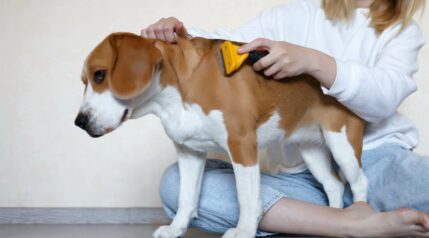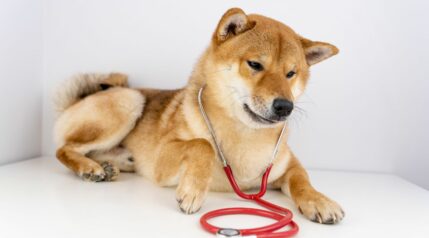Do you find that Fido stares deep into your soul every time you tuck into a bag of peanuts, and you’re wondering whether you can give them a few? Or maybe your partner is forever dropping peanuts down the back of the sofa, and you worry about your pup eating them. Regarding your dog’s health, there are no stupid questions.
Everyone knows that dogs love peanut butter, but can dogs eat peanuts? Here we explore this million-dollar question. A few plain, unsalted peanuts benefit most dogs because they contain protein, essential fatty acids, and other vitamins and minerals. But there are some risks associated with peanuts that you need to be aware of. Plus, some dogs cannot have peanuts whatsoever.
Here we learn about whether peanuts are suitable for dogs and when they are bad for dogs. And what to do if your dog eats a bunch of them. We also uncover the frequently asked questions, leaving no peanut unturned. So, let’s jump straight into the nutty details.
Are Peanuts Good For Dogs?
Peanuts are one of the most common snacks eaten by humans because they are nutritionally beneficial. And in moderation, unseasoned peanuts are good for dogs too. Nuts contain healthy oils, fats, protein, and minerals such as vitamin B6 and potassium. Plus, research shows that feeding your dog a wide variety of food increases mental stimulation, which slows down the aging process.
When Are Peanuts Bad For Dogs?

Although a small number of plain peanuts can benefit your pooch, there are some circumstances when they can do more harm than good.
Peanuts Mixed With Other Nuts
Not all nuts are safe for dogs to eat, meaning you need to know what is in the pack of mixed nuts you are about to offer as a snack. Avoid almonds, hickory nuts, macadamia nuts, pecans, and walnuts. Almonds and hickory nuts are extremely difficult for dogs to digest. And macadamia nuts, pecans, and walnuts are all toxic to dogs, even in small amounts.
Peanuts Mixed With Dried Fruit
Bags of peanuts often come mixed with dried fruits too. Although some dried fruits are okay for Fido to eat in moderation, such as apples and cranberries, some dried fruits are off-limits. So, you need to know what else is in that bag of nuts and fruit before offering it to your pooch.
Raisins are highly toxic to dogs, and just one can cause your pooch kidney failure and death. It doesn’t matter how little or large your dog is. A Chihuahua might eat two raisins and be fine, whereas an English Mastiff might eat one and need immediate veterinary attention. If you suspect your pooch has eaten a raisin, seek immediate veterinary attention.
Chocolate-Coated Peanuts
Chocolate is toxic to dogs, meaning chocolate-covered peanuts are a big no-no. Chocolate is dose-dependent, meaning smaller dogs are more likely to suffer than larger dogs. Darker chocolate is more problematic than milk or white chocolate, too, as it contains more theobromine, which is the chemical that causes dogs to be so unwell. If you suspect theobromine toxicity, speak to your vet immediately.
Salted & Seasoned Peanuts
Salt can lead to digestive troubles and can irritate the digestive tract. Excess salt can also lead to dehydration, which can be extremely dangerous. Sodium toxicity can lead to tremors, seizures, and electrolyte imbalances. So, it’s best to avoid any food with added salt.
You should avoid seasoned peanuts too. Onion and garlic-based seasoning can lead to secondary hemolytic anemia in dogs, leading to collapse. Plants from the Allium family (onions, garlic, leeks) cause oxidative damage to red blood cells, and the devasting effects can take a few days to develop. Chilli seasoning is not toxic to dogs, but it contains capsaicin which is detrimental to the digestive system and can make dogs extremely unwell.
Peanut Butter
There aren’t many dogs in the world that turn their nose up at peanut butter. Peanut butter is commonly used as a training treat or as a snack smeared into a dog toy such as a Kong. But you can’t feed Fido just any peanut butter. You must ensure it does not contain xylitol, which is highly toxic to dogs. And you need to check that it isn’t full of sugar. Alternatively, purchase a peanut butter explicitly designed for dogs.
Other Things To Be Aware Of
In addition to the variations of peanuts outlined above, there are a few other things you need to be aware of.
Choking Hazard
Like many other hard and round objects, peanuts can easily become a choking hazard. Dogs don’t always chew things properly, and an inhaled peanut could become lodged in their windpipe. Peanuts can also get stuck in the food pipe, leading to other problems. Small dogs are more prone to choking on peanuts than larger dogs, but you must know how to act if you suspect your dog is choking.
Pancreatitis
Peanuts are high in fat, meaning too many peanuts could lead to an episode of pancreatitis. Pancreatitis is where the pancreas becomes inflamed, causing discomfort, and can cause diarrhea, vomiting, and lethargy. It can also lead to other health problems, such as dehydration. Some breeds are more at risk of pancreatitis, such as Dachshunds, Miniature Schnauzers, Cocker Spaniels, and Poodles. Avoid peanuts and other high-fat foods if you have a breed more at risk.
My Dog Ate A Few Peanuts – Should I Be Worried?
It is unlikely that your pooch will become seriously unwell if they eat a few plain peanuts. But even if your dog seems fine, it’s essential to keep monitoring them, as some symptoms can show days later. To avoid any accidents, keep bags of peanuts out of reach and always supervise your pooch when giving them as a treat.
You should contact your vet if your dog has eaten peanuts mixed with other toxic nuts or raisins or is heavily seasoned with poisonous ingredients. If you notice general symptoms of poor health, breathing difficulties, coughing, vomiting, lethargy, or concerns with their mobility, seek immediate veterinarian assistance.
Frequently Asked Questions

Can Dogs Eat Peanuts In The Shell?
No, dogs should not eat peanuts in the shell. The shell is difficult to chew and can quickly become a choking hazard. Plus, it is difficult to digest and can lead to stomach upset. The shell is not toxic, but you should only give peanuts to dogs without the shell.
Can Dogs Eat Peanuts For Birds?
Most dogs head straight to the feet of the bird feeder because that’s where they are most likely to find yummy peanut treats. But they shouldn’t for many reasons. Firstly, many bird feeds contain other nuts and raisins that are toxic to dogs. Secondly, old and damp peanuts breed mold and aflatoxin, which can cause extreme illness, and sometimes death in dogs. Thirdly, discarded peanuts on the floor might be covered in bird poop, leading to stomach upset and illness. Discourage your dog from eating peanuts meant for birds.
Can Dogs Eat Peanut Cookies?
Dogs should not eat human peanut cookies because they have other ingredients, including high amounts of sugar, xylitol, chocolate, and sometimes other nuts. But a peanut butter dog treat would be a great choice.
How Do I Know If My Dog Is Allergic To Peanuts?
Peanut allergies in dogs are rare, but some dogs can be allergic to peanuts. Allergies range from mild to severe. Symptoms include itchy, red skin, excessive licking of the skin, agitation, bald spots, difficulty breathing, and swelling around the mouth, face, and throat. If it’s the first time you are feeding your dog peanuts, give them a minimal amount and see how they react over 48 hours before giving them more.
Final Thoughts
Now you know that dogs can eat peanuts. But only a tiny amount of fresh peanuts as a treat. Not only do peanuts contain health benefits, but they are also delicious and work wonders as a training reward. However, you must ensure that they are unsalted, unseasoned, deshelled, and not mixed with toxic ingredients. Keep peanuts out of reach and only give them to Fido under supervision.






my dog ate like 2 peanuts
🤔